- Home
- Cornelia Funke
Inkheart ti-1 Page 3
Inkheart ti-1 Read online
Page 3
He came slowly toward Meggie, who involuntarily stepped back.
"You met him once," said Dustfinger. "It's a long time ago, you won't remember you were so little. " He held his hand at knee height in the air. "How can I explain what he's like? If you were to see a cat eating a young bird I expect you'd cry, wouldn't you? Or try to help the bird. Capricorn would feed the bird to the cat on purpose, just to watch it being torn apart, and the little creature's screeching and struggling would be as sweet as honey to him."
Meggie took another step backward, but Dustfinger kept advancing toward her.
"I don't suppose you'd get any fun from terrifying people until their knees were so weak they could hardly stand?" he asked. "Nothing gives Capricorn more pleasure. And I don't suppose you think you can just help yourself to anything you want, never mind what or where. Capricorn does. Unfortunately, your father has something Capricorn has set his heart on. "
Meggie glanced at Mo, but he just stood there looking at her.
"Capricorn can't bind books like your father," Dustfinger went on. "In fact, he's not much good at anything except terrifying people. But he's a master of that art. It's his whole life. I doubt if he himself has any idea what it's like to be so paralyzed by fear that you feel small and insignificant. But he knows just how to arouse that fear and spread it, in people's homes and their beds, in their heads and their hearts. His men spread fear abroad like the Black Death, they push it under doors and through mailboxes, they paint it on walls and stable doors until it infects everything around it of its own accord, silent and stinking like a plague. " Dustfinger was very close to Meggie now. "Capricorn has many men," he said softly. "Most have been with him since they were children, and if Capricorn were to order one of them to cut off your nose or one of your ears he'd do it without batting an eyelash. They like to dress in black like crows – only their leader wears a white shirt under his black jacket – and should you ever meet any of them then make yourself small, very small, and hope they don't notice you. Understand?"
Meggie nodded. Her heart was pounding so hard she could scarcely breathe.
"I can see why your father has never told you about Capricorn," said Dustfinger, looking at Mo. "If I had children I'd rather tell them about nice people, too. "
"I know the world's not just full of nice people!" Meggie couldn't keep her voice from shaking with anger and more than a touch of fear.
"Oh yes? How do you know that?" There it was again, that mysterious smile, sad and supercilious at the same time. "Have you ever had anything to do with a real villain?"
"I've read about them. "
Dustfinger laughed aloud. "Yes, of course that almost comes to the same thing!" he said. His mockery hurt like stinging nettles. He bent down to Meggie and looked her in the face. "All the same, I hope reading about them is as close as you ever get," he said quietly.
Mo was stowing Dustfinger's bags in the back of the van. "I hope there's nothing in there that might come flying around our heads," he said as Dustfinger got in the backseat behind Meggie. "With your trade I wouldn't be surprised."
Before Meggie could ask what trade that was, Dustfinger opened his backpack and carefully lifted out an animal. It was blinking sleepily. "Since we obviously have quite a long journey ahead of us," he told Mo, "I'd like to introduce someone to your daughter."
The creature was almost the size of a rabbit, but much thinner, with a bushy tail now draped over Dustfinger's chest like a fur collar. It dug its slender claws into his sleeve while inspecting Meggie with its gleaming beady black eyes, and when it yawned it bared teeth as sharp as needles.
"This is Gwin," said Dustfinger. "You can tickle him behind the ears if you like. He's very sleepy at the moment, so he won't bite. "
"Does he usually?" asked Meggie.
"Yes," said Mo, getting back behind the wheel. "If I were you I'd keep my fingers away from that little brute. "
But Meggie couldn't keep her hands off any animal, however sharp its teeth. "He's a marten or something like that, right?" she asked.
"Something of that nature. " Dustfinger put his hand in his pants pocket and gave Gwin a piece of dry bread. Meggie stroked his little head as he chewed – and her fingertips found something hard under the silky fur: tiny horns growing beside his ears. Surprised, she took her hand away. "Do martens have horns?"
Dustfinger winked at her and let Gwin climb back into the backpack. "This one does," he said.
Bewildered, Meggie watched him fasten the straps. She felt as if she were still touching Gwin's little horns. "Mo, did you know that martens have horns?" she asked.
"Oh, Dustfinger stuck them on that sharp-toothed little devil of his. For his performances."
"What kind of performances?" Meggie looked inquiringly, first at Mo, then at Dustfinger, but Mo just started the engine and Dustfinger, who seemed to have come far, judging by his bags, took off his boots and stretched out on Mo's bed in the van with a deep sigh. "Don't give me away, Silvertongue," he said before he closed his eyes. "I have my own secrets, you know. And for those I need darkness."
They must have driven fifty kilometers, and Meggie was still trying to figure out what he could possibly have meant.
"Mo?" she asked, when Dustfinger began snoring behind them. "What does this Capricorn want from you?" She lowered her voice before she spoke the name, as if that might remove some of the menace from it.
"A book," replied Mo, without taking his eyes off the road.
"A book? Then why not give it to him?"
"I can't. I'll explain soon, but not now, all right?"
Meggie looked out of the van window. The world they were passing outside already looked unfamiliar – unfamiliar houses, unfamiliar roads, unfamiliar fields, even the trees and the sky looked unfamiliar – but Meggie was used to that. She had never really felt at home anywhere. Mo was her home, Mo and her books, and perhaps the camper van that carried them from one place to the next.
"This aunt we're going to see," she said, as they drove through an endless tunnel. "Does she have any children?"
"No," said Mo, "and I'm afraid she doesn't particularly like children either. But as I said, I'm sure you'll get along well with her."
Meggie sighed. She could remember several aunts, and she hadn't gotten along particularly well with any of them.
They were driving through mountains now, the slopes on both sides of the road rose ever more steeply, and there came a point where the houses looked not just unfamiliar but really different. Meggie tried to pass the time by counting tunnels, but when the ninth swallowed them up and the darkness went on and on she fell asleep. She dreamed of martens in black jackets and a book in a brown-paper cover.
4. A HOUSE FULL OF BOOKS
There is a sort of busy worm. That will the fairest book deform. Their tasteless tooth will tear and taint The poet, patriot, sage or saint, Nor sparing wit nor learning. Now, if you'd know the reason why, The best of reasons I'll supply: 'Tis bread to the poor vermin.
J. Doraston, quoted by W. Blades
Meggie woke up because it was so quiet. The regular sound of the engine that had lulled her to sleep had stopped. The driver's seat beside her was empty. It took Meggie a little while to remember why she wasn't in bed at home. Tiny dead flies were stuck to the windshield, and the van was parked outside an iron gate. It looked alarming, with sharp ashen-gray spikes, a gate made of spearheads just waiting to impale anyone who tried to clamber over. It reminded Meggie of one of her favorite stories, the tale of the Selfish Giant who wouldn't let children into his garden. This was exactly how she had imagined his garden gate.
Mo was standing in the road with Dustfinger. Meggie got out and went over to them. On the right of the road a densely wooded slope fell steeply to the bank of a wide lake. The hills on the other side rose from the lake like giants emerging from the depths. The water was almost black, and pale twilight, darkly reflected in the waves, was already spreading across the sky. The first lights were coming on in t
he houses on the bank, looking like glowworms or fallen stars.
"A lovely place, isn't it?" Mo put his arm around Meggie's shoulders. "I know you like stories about robbers. See that ruined castle? A notorious robber band once lived there. I must ask Elinor about them. She knows everything about this lake."
Meggie just nodded and rested her head against his shoulder. She was so tired she felt quite dizzy, but for the first time since they had set off Mo's face wasn't looking grim with anxiety. "Where does she live, then?" asked Meggie, stifling a yawn. "Not behind that spiky gate?"
"Actually, yes. This is the entrance to her property. Not very inviting, is it?" Mo laughed and led Meggie across the road. "Elinor is very proud of this gate. She had it specially made. It's copied from a picture in a book."
"A picture of the Selfish Giant's garden?" murmured Meggie, peering through the intricately twining iron bars.
"The Selfish Giant?" Mo laughed. "No, I think it was another story. Although that one would suit Elinor pretty well. "
Tall hedges grew on both sides of the gate, their thorny branches hiding any view of what lay beyond. But even through the iron bars Meggie could see nothing promising except for tall rhododendron bushes and a broad gravel drive that soon disappeared between them.
"Looks like you have rich relations," Dustfinger whispered in her ear.
"Yes, Elinor is quite rich," said Mo, drawing Meggie away from the gate. "But she'll probably end up poor as a church mouse because she spends so much money on books. I think she'd sell her soul to the devil without thinking twice if he offered her the right book for it." He pushed the heavy gate open with a single movement.
"What are you doing?" asked Meggie in alarm. "We can't just drive in." For there was a sign beside the door, still clearly legible even if some of the letters were partly hidden by the leaves of the hedge:
PRIVATE PROPERTY. NO UNAUTHORIZED ENTRY.
Meggie didn't think it sounded very inviting.
Mo, however, only laughed. "Don't worry," he said, opening the gate wider. "The only thing Elinor guards with a burglar alarm is her library. She couldn't care less who walks through this gate. She's not what you'd call a nervous woman, and she doesn't have many visitors anyway."
"What about dogs?" Dustfinger peered anxiously into the strange garden. "That gate suggests at least three ferocious dogs to me. Big ones, the size of calves. "
But Mo just shook his head. "Elinor hates dogs," he said, going back to the van. "OK, get in. "
Elinor's grounds were more like a wood than a garden. Once they were through the gateway the drive curved, as if taking a deep breath before going on up the slope, then lost itself among dark firs and chestnut trees, which grew so close together their branches made a tunnel. Meggie was just thinking it would never end when the trees suddenly receded, and the drive brought them to an open space covered with gravel and surrounded by carefully tended rose beds.
A gray station wagon stood on the gravel in front of a house that was bigger than the school Meggie had been attending for the last year. She tried to count the windows, but soon gave up. It was a very beautiful house but looked just as uninviting as the iron gate. Perhaps it was only the evening twilight that made the ochre yellow of the plaster look so dirty. And perhaps the green shutters were closed only because night was already falling over the surrounding mountains. Perhaps. But Meggie would have bet her last book they were seldom open even in the daytime.
The dark wooden front door looked as forbidding as a tightly closed mouth, and Meggie involuntarily reached for Mo's hand as they approached it.
Dustfinger followed warily, with his battered backpack over his shoulder. Gwin was probably still asleep inside it. When Mo and Meggie went up to the door he kept a couple of steps behind them, looking uneasily at the closed shutters as if he suspected that the mistress of the house was watching them from one of the windows.
There was a small barred window beside the front door, the only one not hidden behind green shutters. Below it was another notice:
IF YOU INTEND TO WASTE MY TIME ON TRIVIA,
YOU'D BETTER GO AWAY NOW!
Meggie cast Mo an anxious glance, but he only made an encouraging face at her and pressed the bell.
Meggie heard it ringing inside the big house, but nothing happened for quite a while. A magpie fluttered out of one of the rhododendron bushes growing near the house, and a couple of fat sparrows pecked busily at invisible insects in the gravel, but that was all. Meggie was just throwing them the breadcrumbs she had found in her jacket pocket – left over from a picnic on some long-forgotten day – when the door suddenly opened.
The woman who came out was older than Mo, quite a lot older – although Meggie could never be quite sure how old grown-ups were. Her face reminded Meggie of a bulldog, but perhaps that was more her ferocious expression than its features. She wore a mouse-gray sweater and an ash-gray skirt, with a pearl necklace around her short neck and felt slippers on her feet, the kind of slippers Meggie had once had to wear when she and Mo had visited a historic castle. Elinor's hair was gray, too. She had pinned it up, but strands were hanging down everywhere as if she had done it impatiently and in a hurry. She didn't look as if she spent much time in front of a mirror.
"Good heavens, Mortimer! What a surprise!" she said, without wasting time on further greetings. "Where did you spring from?" Her voice sounded brusque, but her face couldn't entirely hide the fact that she was pleased to see Mo.
"Hello, Elinor," said Mo, putting his hand on Meggie's shoulder. "Do you remember Meggie? As you can see, she's grown up quite a bit now."
Elinor cast Meggie a brief, irritated glance. "Yes, so I see," she said. "It's only natural for children to grow, wouldn't you say? As far as I remember, it's been some years since I last set eyes on either you or your daughter, so, to what do I owe the unexpected honor of your visit today? Are you finally going to take pity on my poor books?"
"That's right." Mo nodded. "One of my library commissions has been postponed – you know how libraries are always short of money."
Meggie looked at him uneasily. She hadn't realized he could lie quite so convincingly.
"And because it was so sudden," Mo continued, "I couldn't find anywhere for Meggie to go, so I brought her with me. I know you don't like children, but Meggie won't leave jam on your books or tear out pages to wrap up dead frogs."
Elinor muttered something suspicious and scrutinized Meggie as if she thought her capable of any kind of disgraceful conduct, whatever her father might say. "When you last brought her we could at least put her in a playpen," she remarked coldly. "I don't suppose that would do now." Once again, she looked Meggie up and down as if she were being asked to admit a dangerous animal to her house.
Meggie felt her anger make the blood rise to her face. She wanted to go home, or get back in the camper van and go somewhere else, anywhere, so long as she didn't have to stay with this horrible woman whose cold pebble eyes were boring holes in her face.
Elinor's gaze moved from Meggie to Dustfinger, who was still standing in the background looking awkward. "And who's this?" She looked inquiringly at Mo. "Do I know him?"
"This is Dustfinger, a… a friend of mine. " Perhaps only Meggie noticed Mo's hesitation. "He wants to go on south, but maybe you could put him up for a night in one of your many rooms?"
Elinor folded her arms. "Only on the condition that his name has nothing to do with the way he treats books," she said. "And he'll have to put up with rather Spartan accommodations in the attic, because my library has grown a great deal over the last few years. Nearly all my guest bedrooms are full of books. "
"How many books do you have?" asked Meggie. She had grown up among piles of books, but even she couldn't imagine there were books behind all the windows of this huge house.
Elinor inspected her again, this time with unconcealed con tempt. "How many?" she repeated. "Do you think I count them like buttons or peas? A very, very great many. There are probably more books
in every single room of this house than you will ever read – and some of them are so valuable that I wouldn't hesitate to shoot you if you dared touch them. But because you're a clever girl, or so your father assures me, you wouldn't do that anyway, would you?"
Meggie didn't reply. Instead, she imagined standing on tip toe and spitting three times into this old witch's face.
However, Mo just laughed. "You haven't changed, Elinor," he remarked. "A tongue as sharp as a paper knife. But I warn you, if you harm Meggie I'll do the same to your beloved books. "
Elinor's lips curled in a tiny smile. "Well said," she answered, stepping aside. "You obviously haven't changed either. Come in. I'll show you the books that need your help, and a few others as well. "
Meggie had always thought Mo had a lot of books. She never thought so again, not after setting foot in Elinor's house.
There were no haphazard piles lying around as they did at home. Every book obviously had its place. But where other people have wallpaper, pictures, or just an empty wall, Elinor had bookshelves. The shelves were white and went right up to the ceiling in the entrance hall through which she had first led them, but in the next room and the corridor beyond it the shelves were as black as the tiles on the floor,
"These books," announced Elinor with a dismissive gesture as they passed the closely ranked spines, "have accumulated over the years. They're not particularly valuable, mostly of mediocre quality, nothing out of the ordinary. Should certain fingers be unable to control themselves and take one off the shelf now and then," she added, casting a brief glance at Meggie, "I don't suppose the consequences would be too serious. Just so long as once those fingers have satisfied their curiosity they put every book back in its proper place again and don't leave any unappetizing bookmarks inside." Here Elinor turned to Mo. "Believe it or not," she said, "I actually found a dried-up slice of salami used as a bookmark in one of the last books I bought, a wonderful nineteenth-century first edition."

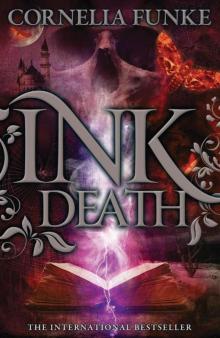 Inkdeath
Inkdeath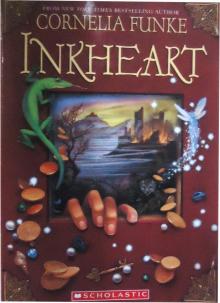 Inkheart
Inkheart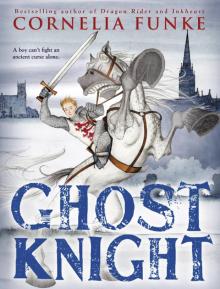 Ghost Knight
Ghost Knight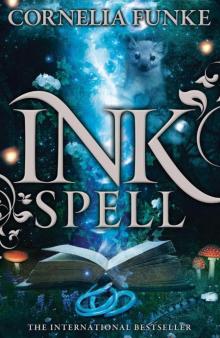 Inkspell
Inkspell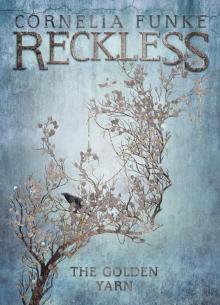 The Golden Yarn
The Golden Yarn Fearless
Fearless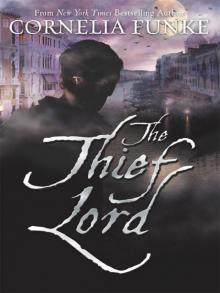 The Thief Lord
The Thief Lord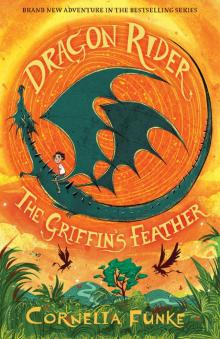 The Griffin's Feather
The Griffin's Feather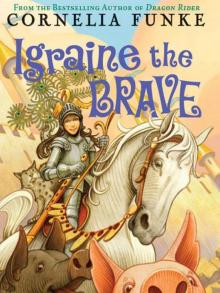 Igraine the Brave
Igraine the Brave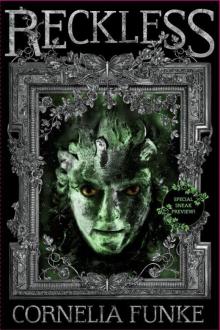 Reckless
Reckless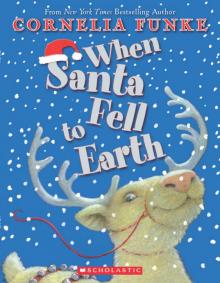 When Santa Fell to Earth
When Santa Fell to Earth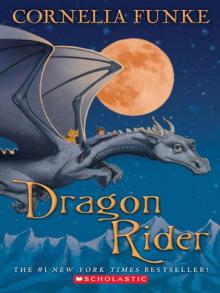 Dragon Rider
Dragon Rider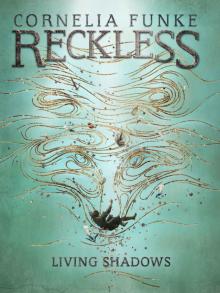 Living Shadows
Living Shadows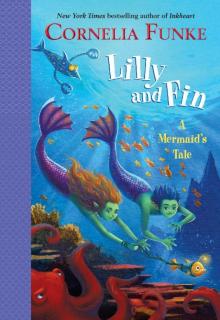 Lilly and Fin: A Mermaid's Tale
Lilly and Fin: A Mermaid's Tale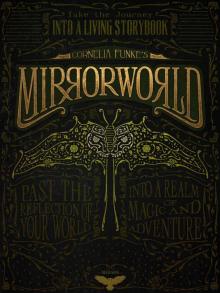 The MirrorWorld Anthology
The MirrorWorld Anthology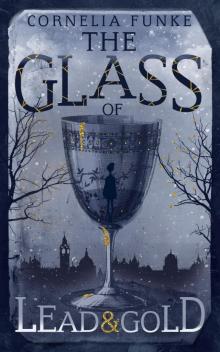 The Glass of Lead and Gold
The Glass of Lead and Gold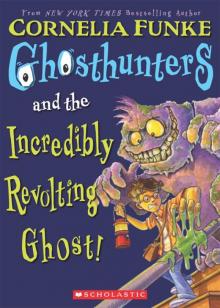 Ghosthunters and the Incredibly Revolting Ghost
Ghosthunters and the Incredibly Revolting Ghost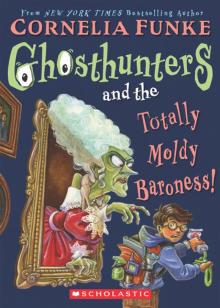 Ghosthunters and the Totally Moldy Baroness!
Ghosthunters and the Totally Moldy Baroness!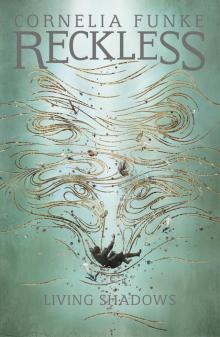 Reckless II
Reckless II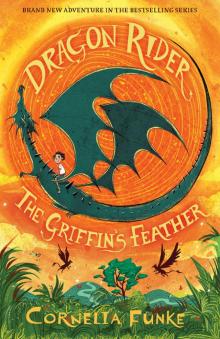 Griffin's Feather
Griffin's Feather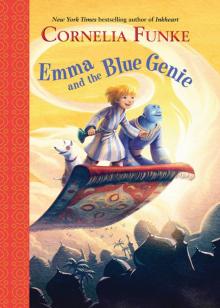 Emma and the Blue Genie
Emma and the Blue Genie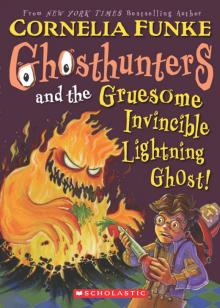 Ghosthunters and the Gruesome Invincible Lightning Ghost
Ghosthunters and the Gruesome Invincible Lightning Ghost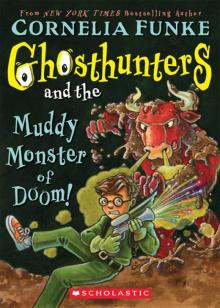 Ghosthunters and the Muddy Monster of Doom!
Ghosthunters and the Muddy Monster of Doom!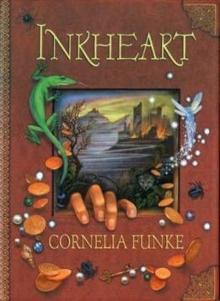 Inkheart ti-1
Inkheart ti-1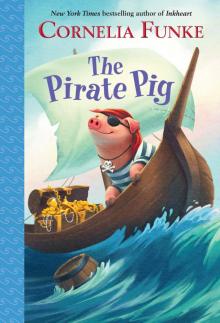 The Pirate Pig
The Pirate Pig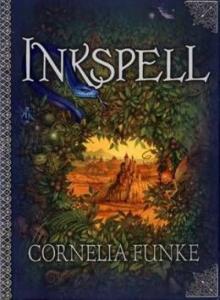 Inkspell ti-2
Inkspell ti-2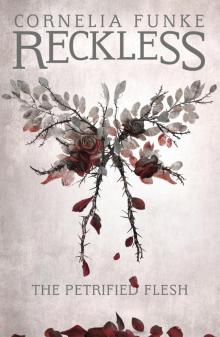 The Petrified Flesh
The Petrified Flesh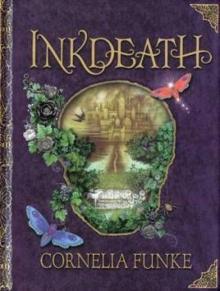 Inkdeath ti-3
Inkdeath ti-3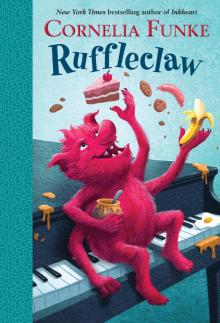 Ruffleclaw
Ruffleclaw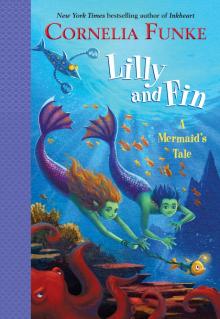 Lilly and Fin
Lilly and Fin